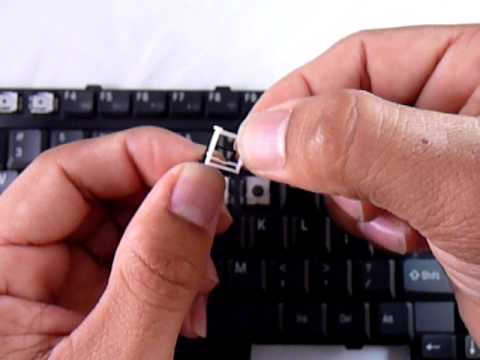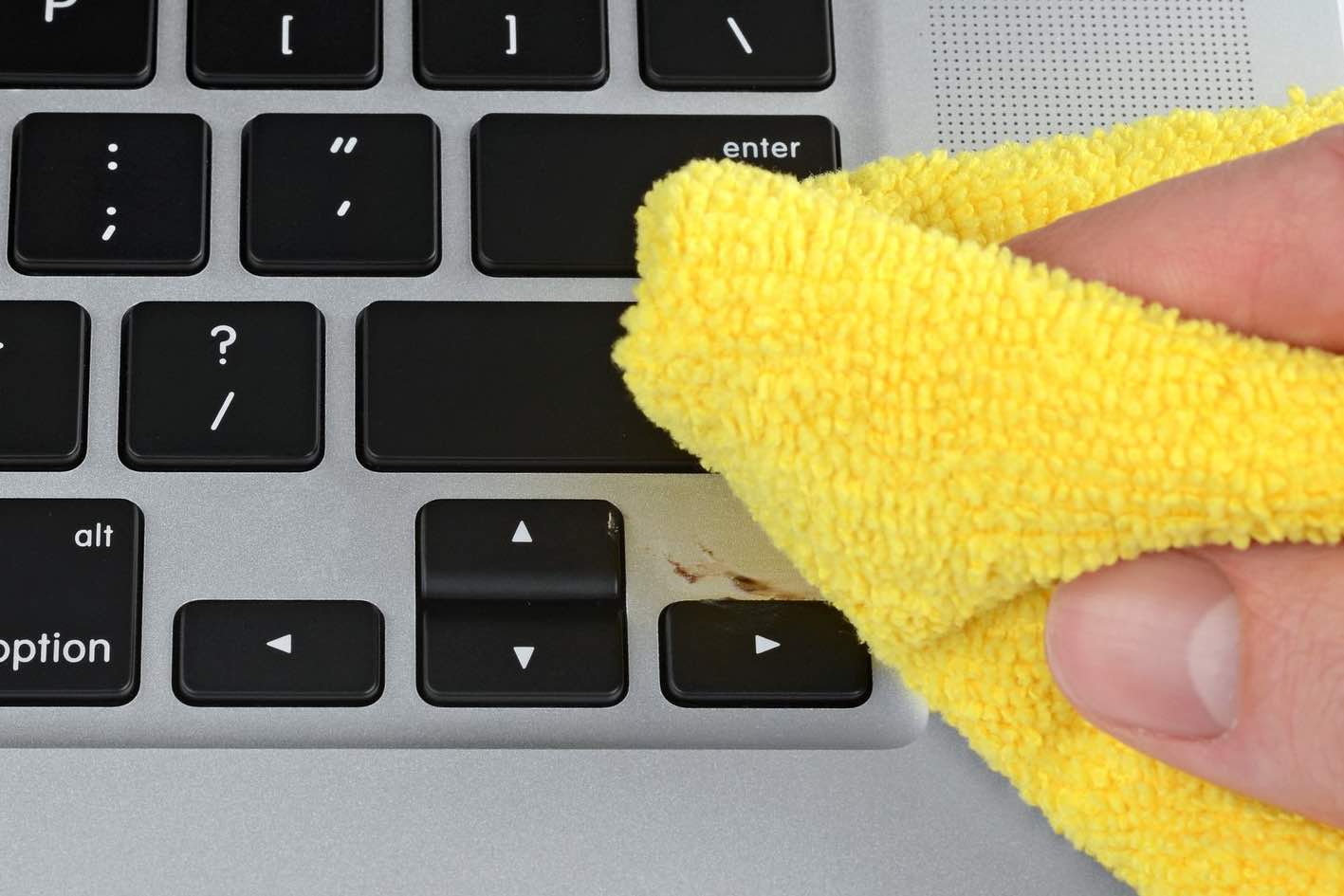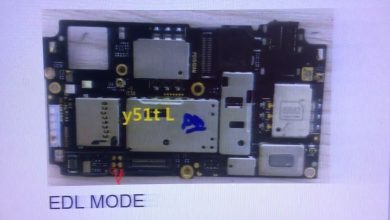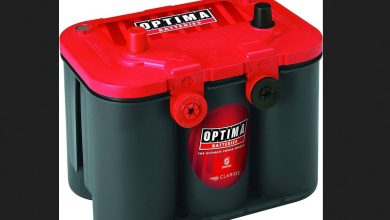How to Fix Sticky Keys on Laptop

To fix sticky keys on a laptop, simply clean the keyboard with isopropyl alcohol. Wet a microfiber cloth or cotton swab with the alcohol and gently wipe the keys.
Pay extra attention to any keys that are particularly sticky, and repeat the process if necessary. This method is effective in removing dirt, dust, and any residue that may be causing the keys to stick. It is important to note that if any liquid has made its way under the keys, they should be removed for thorough cleaning.
By following these steps, you can easily resolve the issue of sticky keys on your laptop.
2. Causes Of Sticky Keys

Credit: www.ifixit.com
3. Cleaning Sticky Keyboard Keys
3. Cleaning Sticky Keyboard Keys
Step-by-step guide on how to clean sticky keyboard keys
To effectively clean sticky keyboard keys, you can use rubbing alcohol and a lint-free cloth. Here’s how:
- Start by unplugging your laptop or turning off your keyboard.
- Moisten a lint-free cloth or cotton swab with rubbing alcohol.
- Gently rub the damp cloth or swab around each key post, paying special attention to any keys that are particularly sticky.
- If any liquid has made its way under the keys, carefully remove the key to clean the area thoroughly.
- If your keys are removable, take a photo of the keyboard layout before removing them to ensure you can reposition them correctly.
- Once you have cleaned all the keys, allow them to air dry before plugging in or turning on your laptop or keyboard.
Note: If your keys are physically sticky or stuck in the pressed position, additional steps may be required to safely fix the issue.
4. Cleaning A Laptop Keyboard Without Removing Keys
|
The best way to fix a sticky laptop keyboard without removing keys is by cleaning it with isopropyl rubbing alcohol. Start by dampening a lint-free cloth with the rubbing alcohol. Gently rub the cloth over the keys, paying special attention to any keys that are particularly sticky. The rubbing alcohol will help dissolve any sticky residue and remove dirt and grime that may be causing the keys to stick. If any liquid made its way under the keys, it’s important to remove the key and clean the area thoroughly. Use a cotton swab dampened with rubbing alcohol to clean around each key post, ensuring all liquid is removed. Repeat the process as necessary, giving extra attention to stubbornly sticky keys. Once you’re done cleaning, allow the keyboard to air dry before using it again. |
5. Fixing Sticky Keys On Laptop – Troubleshooting Tips
1. Cleaning the KeysTo fix sticky keys on a laptop, start by cleaning the keys. Use a lint-free cloth dampened with isopropyl rubbing alcohol to gently wipe the keys. Pay special attention to any keys that are particularly sticky, and make multiple passes if necessary. If the keys are removable, it’s a good idea to take a photo of the keyboard before removing them to remember their positions. |
2. Checking for Physical StickingIf cleaning the keys doesn’t solve the problem, check for physical sticking. Hold the laptop face down over a white paper and gently tap on the back to shake out any debris that might be causing the keys to stick. You can also use a can of compressed air to blow out any dust or lint that might be trapped under the keys. |
3. Using Isopropyl AlcoholIf the keys are still sticking, try pouring a small amount of isopropyl alcohol onto a cotton swab and gently rub it around the edges of the sticky keys. Be careful not to use too much liquid, as it can damage the keyboard. Allow the alcohol to evaporate completely before using the laptop again. |
4. Seeking Professional HelpIf none of the troubleshooting tips work, it may be necessary to seek professional help. Contact the laptop manufacturer or a computer repair technician to diagnose and fix the sticky keys issue. |
5. Preventing Future IssuesTo prevent the keys from becoming sticky in the future, it’s important to keep the laptop clean. Regularly clean the keyboard with a soft cloth and avoid eating or drinking near the laptop. Using a keyboard cover can also help protect the keys from spills and debris. |
6. Professional Solutions For Sticky Keys
How to Fix Sticky Keys on Laptop
6. Professional Solutions for Sticky Keys
Discussing the cost of professional keyboard repairs
The cost of professional keyboard repairs can vary depending on the severity of the issue and the brand of the laptop. In some cases, it may be necessary to replace the entire keyboard if the keys are beyond repair. This can range from $50 to $100 or more, depending on the laptop brand and model. However, before opting for professional repairs, there are a few DIY solutions you can try to fix sticky keys on your laptop.
- Clean the keys with rubbing alcohol: Take a lint-free cloth and dampen it with isopropyl rubbing alcohol. Gently rub the cloth over the sticky keys, paying special attention to any keys that are particularly sticky.
- Use a cotton swab: Dip a cotton swab into the rubbing alcohol and clean around each key, removing any excess dirt or grime that may be causing the stickiness.
- Try compressed air: Use a can of compressed air to blow away any debris or dust that may be causing the keys to stick. Make sure to hold the can upright and use short bursts of air to avoid damaging the keyboard.
- Replace the keycaps: If the sticky keys persist, you can try removing the keycaps and cleaning them individually. Refer to the laptop manufacturer’s instructions or online tutorials for guidance on how to safely remove and clean the keycaps.
By trying these DIY solutions, you may be able to fix the sticky keys on your laptop without the need for professional repairs. However, if none of these methods work or if the issue is more complex, it is recommended to consult a professional technician for further assistance.
Frequently Asked Questions For How To Fix Sticky Keys On Laptop
What Causes Sticky Keys On A Laptop?
Sticky keys on a laptop are usually caused by spilled liquid or excess dust build-up. To fix the problem, clean the keys with rubbing alcohol. Dab a lint-free cloth in isopropyl rubbing alcohol and gently rub it over the sticky keys.
Pay extra attention to any keys that are particularly sticky.
How To Fix Sticky Keys On Laptop Without Taking The Keys Off?
To fix sticky keys on a laptop without taking the keys off, clean the keys with rubbing alcohol. Dab a lint-free cloth in isopropyl rubbing alcohol and gently rub the cloth over the keys. Pay extra attention to any sticky keys.
Repeat if necessary.
How Much Does It Cost To Fix A Sticky Key On A Laptop?
The cost of fixing a sticky key on a laptop may vary, but it is generally affordable. Some simple methods like cleaning the keys with isopropyl alcohol can be done at home for minimal cost. However, if the issue persists or requires professional assistance, the cost may increase.
It is best to contact a laptop repair service for a precise estimate.
How Do I Clean Sticky Laptop Keyboard Keys?
To clean sticky laptop keyboard keys, dampen a cloth with isopropyl alcohol and gently wipe the keys. Pay extra attention to the sticky keys and repeat if necessary.
Conclusion
To fix sticky keys on your laptop, one simple and effective solution is to use isopropyl alcohol. Wet a microfiber cloth or a cotton swab with the alcohol and gently wipe the sticky keys. If necessary, you can also hold the keyboard face-down over some white paper and tap on the back to remove any debris.
Remember to take extra care when cleaning mechanical keyboards or laptops to prevent any liquid from getting under the keys. By following these steps, you can easily fix sticky keys on your laptop and ensure smooth typing experience.





